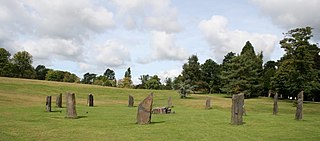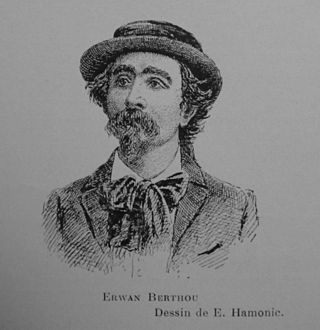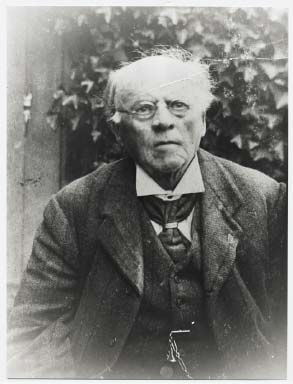
Hu Gadarn is a supposed Welsh legendary figure who appears in several of a series of Welsh Triads produced by the Welsh antiquarian and literary forger Iolo Morganwg. These triads, which Iolo put forth as medieval works, present Hu as a culture hero of the ancient Britons who introduced ploughing. However, it is now known that the triads, like all of the so-called "Third Series" of triads, were fabricated by Iolo himself. The name "Hu Gadarn" earlier appeared in a Welsh translation of a French romance about Charlemagne. Still, Iolo's version of Hu Gadarn was taken up in the 20th century by the poet Robert Graves, who associated him with other Celtic figures; since then he has been popular among neopagans.

Archdruid is the title used by the presiding official of the Gorsedd. The Archdruid presides over the most important ceremonies at the National Eisteddfod of Wales including the Crowning of the Bard, the award of the Prose Medal and the Chairing of the Bard. Although Iolo Morganwg was the first to preside over the Gorsedd when the National Eisteddfod came into being, his successor David Griffith, under the bardic name "Clwydfardd", was the first to be known by the official title "Archdruid".

Edward Williams, better known by his bardic name Iolo Morganwg, was a Welsh antiquarian, poet and collector. He was seen as an expert collector of Medieval Welsh literature, but it emerged after his death that he had forged several manuscripts, notably some of the Third Series of Welsh Triads. Even so, he had a lasting impact on Welsh culture, notably in founding the secret society known as the Gorsedd, through which Iolo Morganwg successfully co-opted the 18th-century Eisteddfod revival. The philosophy he spread in his forgeries has had an enormous impact upon neo-Druidism. His bardic name is Welsh for "Iolo of Glamorgan".
Awen is a Welsh, Cornish and Breton word for "inspiration".
John Williams, was an antiquary and Anglican priest. Born in Llangynhafal, Denbighshire Wales in 1811, he graduated from Jesus College, Oxford in 1835 to become the Anglican curate of Llanfor, Merionethshire, where he married Elizabeth Lloyd Williams. In 1843 he became perpetual curate of Nercwys, Flintshire, and rector of Llanymawddwy, Merionethshire, in 1849.

Gorsedd Stones are groups of standing stones constructed for the National Eisteddfod of Wales. They form an integral part of the druidic Gorsedd ceremonies of the Eisteddfod. The stones can be found as commemorative structures throughout Wales and are the hallmark of the National Eisteddfod having visited a community.

Goursez Vreizh is the national gorsedd of Brittany. It often has delegates from the Welsh gorsedd and Gorsedh Kernow in Cornwall. The Breton organisation is itself based on the Welsh-based Gorsedd, which was founded by Iolo Morganwg in 1792.

Erwan Berthou was a French and Breton language poet, writer and neo-Druidic bard. His name is also spelled Erwan Bertou and Yves Berthou.
Jean Le Fustec was a Breton bard, and the first Archdruid of the Goursez Vreizh. He is also known by his Breton language name Yann ab Gwilherm and his Druidic name Lemenik.
Richard Williams Morgan (1815–1889), also known by his bardic name Môr Meirion, was a Welsh Anglican priest, Welsh nationalist, campaigner for the use of the Welsh language and author.
The Ancient British Church was a British religious movement supposedly founded in the 19th century by Jules Ferrette and Richard Williams Morgan. The Ancient British Church ceased to exist in 1944.

David Griffith, known by the bardic name of Clwydfardd, was a Welsh poet and Archdruid of the National Eisteddfod of Wales.
Davod Aur Edeyrn, "The Golden-tongued" fl. 1270, was a Welsh bard and grammarian.

Owen Morgan, also known by his bardic name Morien was a Welsh journalist, and a writer of books on the subject of neo-druidism. Morgan developed the mythology of both Iolo Morganwg and Myfyr Morganwg, and his druidical writing is not taken seriously by historians.

Druidry, sometimes termed Druidism, is a modern spiritual or religious movement that promotes the cultivation of honorable relationships with the physical landscapes, flora, fauna, and diverse peoples of the world, as well as with nature deities, and spirits of nature and place. Theological beliefs among modern Druids are diverse; however, all modern Druids venerate the divine essence of nature.
Taliesin Williams was a Welsh poet and author, and son of the notable Iolo Morganwg.

Raglan Library was a library located in Raglan Castle in the county of Monmouthshire in south east Wales.

Barddas is a book of material compiled and written by the Welsh writer Iolo Morganwg. Dressed as an authentic compilation of ancient Welsh bardic and druidic theology and lore, its contents are largely Iolo's invention. It was posthumously published by John Williams for the Welsh Manuscripts Society in two volumes, in 1862 and 1874.

The Coelbren y Beirdd is an script created in the late eighteenth century by the literary forger Edward Williams, best known as Iolo Morganwg.

Gorsedd Cymru, or simply the Gorsedd or the Orsedd, is a society of Welsh-language poets, writers, musicians and others who have contributed to the Welsh language and to public life in Wales. Its aim is to honour such individuals and help develop and promote their fields in addition to maintaining relationships with other Celtic nations and Y Wladfa in Patagonia. The Gorsedd is most prominent at the National Eisteddfod of Wales where it is responsible for the main ceremonies held.











